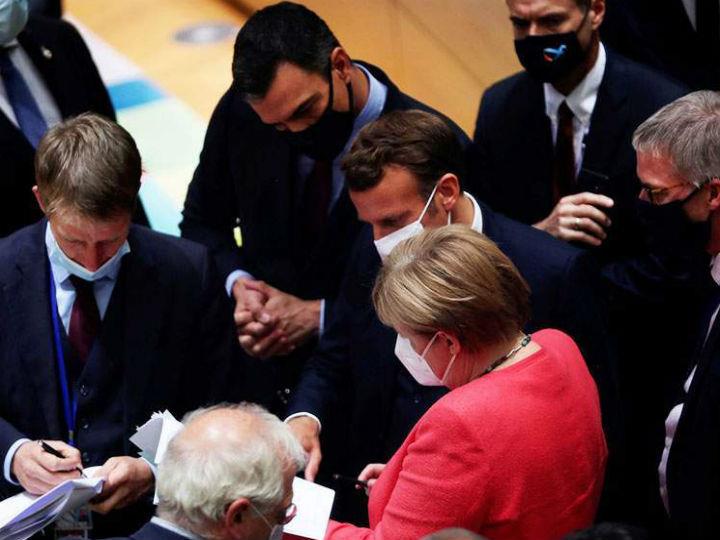by Judy Dempsey*
It was never going to be an easy summit. When it comes to agreeing the EU’s seven-year budget, the multiannual financial framework (MFF), every single member state puts its own interests first.
But this time around, when EU leaders gathered in Brussels on July 17, 2020, for the start of four days of wrangling and horse-trading during a special European Council, the political circumstances had profoundly changed since the last budget negotiations of 2013.
Europe and some other parts of the world have been hard hit by the coronavirus that broke out in China in December 2019 and triggered a global pandemic.
The transatlantic relationship is in terrible shape with the administration of U.S. President Donald Trump walking away from the multilateral agreements that have shaped the post-1945 order.
Russia has been meddling in the internal politics of several European countries, particularly Britain. China, trampling increasingly on human rights, is pursuing its policy of divide and rule in Europe.
As for the EU itself, since the last budget negotiations, its ability to do foreign policy has remained abysmal.
Its record in the Middle East, in Libya, in the ten-year-old war in Syria—to mention just a few conflicts that have cost millions of lives—is nothing to boast about.
If that was not enough to make this summit different from others, Europe—despite the impact the pandemic will have on poor countries—still has no coherent migration, security, or defense policy.
Above all, this summit coincided with some EU member states questioning the very values that the bloc is based on: the rule of law, which includes an independent judiciary, and solidarity.
What an ideal opportunity it was to link the economic recovery of Europe with upholding the principles that are supposed to be the hallmark of the EU. But leaders ducked these issues.
Instead, the focus of the summit was about putting together a financial package to ensure the economic recovery of the bloc, not deciding its future direction. The sums are huge.
Very briefly, EU leaders agreed two packages. The special, one-off Next Generation EU recovery fund, worth €750 billion and consisting of grants and loans, is designed to get member states hard hit by the pandemic back on their feet as quickly as possible.
In addition, the EU’s next budget, the MFF for 2021–2027, amounts to €1,074.3 billion. In total, EU leaders at the summit signed off on over €1.8 trillion.
Every leader could return home with something to show their voters.
In particular, all the threats issued by Dutch Prime Minister Mark Rutte about linking funds to the rule of law evaporated. The reactions by the Hungarian and Polish leaders reeked of smugness. “We fought it out!” wrote Hungarian Prime Minister Viktor Orban on Facebook. “Poland cannot be deprived of a single euro,” boasted Polish Prime Minister Mateusz Morawiecki to reporters.
And no wonder they could brag. Here’s a reference to the rule of law in the summit conclusions: “The European Council also underlines the importance of the respect of the rule of law. Based on this background, a regime of conditionality to protect the budget and Next Generation EU will be introduced.” It will be up to the European Commission to propose measures. At least unanimity won’t prevail, which means Budapest and Warsaw will not be able to block decisions with their veto.
Yet, given the extraordinary circumstance of the summit, three things do stand out.
The first is the increasing powers of the commission. It will now be allowed to incur common debt, something Germany would have blocked had it not been for the coronavirus. This summit was a step toward more integration.
The second is German Chancellor Angela Merkel’s role. What lucky timing that Germany took over the helm of the EU’s rotating presidency on July 1. Merkel, whose authority at home and in the EU has increased because of her calm handling of the pandemic, was determined to find unity through compromises, even if some of them were unsavory.
The third is how France and Germany proved that their cooperation is indispensable for the EU. French President Emmanuel Macron and Merkel each had to give ground over the Next Generation EU package. Merkel had earlier given way by allowing a certain amount to be allocated in grants. Macron accepted that some would be disbursed as loans.
The devil, as ever, is in the detail—and in the implementation. The sixty-seven–page summit conclusions insist that countries have to deliver on reforms and that there will be a rigorous oversight of how funds are disbursed.
More revealing is the order of priorities in the next MFF. Its first heading is the “Single market, Innovation and Digital” followed by “Cohesion, Resilience and Values.” Other headings such as “Migration and Border Management,” “Security and Defense,” and “Neighborhood and the World” get short shrift. And how.
In short, with so much emphasis on economic recovery and so little emphasis on its future direction, Europe as a strategic political player has been postponed once again.
*nonresident senior fellow at Carnegie Europe and editor in chief of Strategic Europe
**first published in: carnegieeurope.eu




 By: N. Peter Kramer
By: N. Peter Kramer
